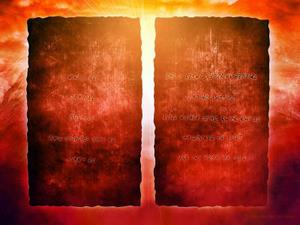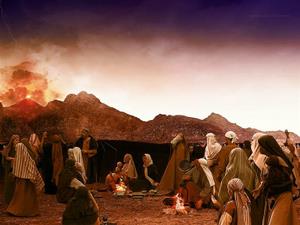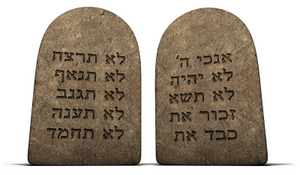|
יתרוֹ - "Jethro" |
||
|
 |
|
Exodus 18:1
Now Jethro the priest of Midian, Moses' father-in-law, heard of all that G-d had done for Moses and for Israel His people, how the LORD had brought Israel out of Egypt.
| << Previous (B'shalach) | Next (Mishpatim) >> |
The Hebrew Words
Yitro is the literal Hebrew name of Moshe's father-in-law. Yitro means "his abundance." Yitro is also known as Hovav and Hovav means "cherished, favored, and beloved." Yitro (Strong's #3503) is used 11 times in 9 verses in the Tanakh. Every instance refers to the man called "Jethro" in English.
First use in Scripture
The first time Yitro is used in Scripture is in Exodus 3:1.
Exodus 3:1
Now Moses was pasturing the flock of Yitro his father-in-law, the priest of Midian; and he led the flock to the west side of the wilderness and came to Horeb, the mountain of G-d.
Last use in Scripture
The last time Yitro is used in Scripture is in Exodus 18:12.
Exodus 18:12
Then Yitro, Moses' father-in-law, took a burnt offering and sacrifices for God, and Aaron came with all the elders of Israel to eat a meal with Moses' father-in-law before God.
Parashah Outline
- Yitro, Moshe's Father-in-law - Exodus 18:1
- Yitro Counsels Moshe - Exodus 18:17
- Moshe on Sinai - Exodus 19:1
- YHVH visits Sinai - Exodus 19:18
- The Ten Commandments are Given - Exodus 20:1
Portraits of Messiah
Verse by Verse Notes
Exodus 19:22
At Mount Sinai, G-d warns Moshe not to let the people "break through to the LORD to gaze, and many of them perish." (verse 21). This is before the giving of the Ten Commandments [the Ten Words], and before the giving of the rest of the Law. In verse 22, G-d commands Moshe, "Let the priests who come near to the LORD consecrate themselves, or else the LORD will break out against them".
The priests?
The priesthood had not been established yet! Although the instructions for ordaining and consecrating Aaron, the Levites, and the Tabernacle were given in Exodus 28, 29, and 30, the Tabernacle was not constructed and in place until "the first month of the second year" (Exodus 40:17). This detail suggests that the events of Exodus 20 and the giving of the Ten Commandments occurred after the Tabernacle was constructed, after the priests were ordained, and after the glory of the LORD filled the Tabernacle (Exodus 40:35).
Exodus 19:1, however, specifically states "In the third month after the sons of Israel had gone out of the land of Egypt, on that very day they came into the wilderness of Sinai."
This presents a difficulty. Some say the elders were also considered "priests" by G-d before the Levites were ordained. Others think that G-d gave Moshe an understanding of who the priests were to be in order to obey this commandment. If you have any other ideas about this issue, please contact us and let us know so that we may share with others.
Other Observations
The anomaly of Chapter 18
As parashah Yitro opens we see a repetition of a specific phrase 3 times in the first 5 verses (Exodus 18:1-5): "Yitro... Moshe's father-in-law". Why the repetition?
It seems likely that anyone who has been reading the Torah up to this point would know who Yitro was. He was originally introduced back in Exodus 3:1 and mentioned again in Exodus 4:18 so why reiterate (3 times no less!) that this is "Yitro... Moshe's father-in-law"? It is enough to cause one to take a second look at this parashah... which may be part of the intent of the repetition.
Yitro
Given that Yitro is a (pagan) priest of Midian it may be that Scripture wants to make it abundantly clear via the repetition that Yitro is not blood-kin relations with Moshe. He is an "in-law" and is not to be associated with the Levitical priesthood that G-d is establishing throughout the events of Sinai.
Timing
As the previous chapter (Exodus 17) closes we find the Israelites at Refidim after their successful battle against Amalek. In Chapter 18 we see Moshe daily sitting with the Israelites making known to them "the statutes of G-d and his laws" (Exodus 18:16). How can Moshe be relating the statutes of G-d and his laws when the Israelites have not yet arrived at Mt. Sinai and been given the commandments yet? That happens in chapter 20!
If we look at (Exodus 19) we find that it begins by recording the Israelites leaving Refidim, coming to Sinai, and camping there "in front of the mountain". Chapter 17 ends with the Israelites in Refidim and Chapter 19 begins with the Israelites leaving Refidim. It seems that Chapter 18 is out of chronological sequence with Chapters 17 and 19. This gives us additional reason to examine it more throughly than usual.
In Exodus 18:1 we see Yitro again described as "the priest of Midian". (See Yitro, Moshe's father-in-law for a list of Yitro's names). Midian is not only the name of a geographic region it is also the name of a person. Midian is first mentioned in Genesis 25:2 as a son of Avraham through his wife Keturah.
Yitro literally means "his excellency" and may be viewed as a title rather than a proper name. As such we can read Moshe's father-in-law being introduced as "His Excellency, the Priest of Midian".
Priest of Midian- the friend of G-d?
We first see "priest of Midian" in Exodus 2:16 when it describes seven daughters coming to water their flock. These are the same daughters Moshe helps as he is fleeing from Egypt. In Exodus 2:18 we see these daughters going to Reu'el, their father, and relating the story of Moshe's help. Reu'el means "friend of G-d". In verse 21 we see Reu'el giving his daughter Tzipporah to Moshe in marriage.
Tzipporah
We first see Tzipporah in that verse (Exodus 2:21) and find her mentioned by name only 3 times in the whole of Scripture (including our "anomaly chapter"):
- Exodus 2:21- she is betrothed to Moshe
- Exodus 4:25- when she circumcises her son. This is presumably when Moshe sends her away (as noted in Exodus 18:2) as she is not mentioned again until chapter 18.
- Exodus 18:2- she is brought back to Moshe
Does this foreshadow the future of Israel? It may be. The history given in Scripture paints a similar picture with Israel:
- Jeremiah 31:32- she is betrothed to G-d (He was a "husband" to Israel) at Mt. Sinai
- Jeremiah 3:8- G-d sends her away
- Jeremiah 3:11-13- she is called to return to G-d
Additional insight may be found in examining Tzipporah's name. The name Tzipporah (Strong's #6855) comes from the Hebrew word which means "bird" (Strong's #6833). Considering "birds" in relation to a covenant a few references come to mind:
Genesis 15:9-10 tells us that Avram brought the animals that G-d commanded and made a covenant with Him. That list of animals included a turtledove and a young pigeon. Verse 10 notes that Avram did not cut the birds. As a picture of "the bride" this makes sense. We are to love G-d wholly (Deut 6:4) and not be of two parts (i.e. "double minded" James 1:7-8).
In Matthew 13:31-32 the Master gives a parable telling the talmidim that the kingdom of heaven is like a mustard seed that a man sowed in his field. The mustard seed, although small, grew into a great plant "and becomes a tree" so that the "birds of the air come and nest in its branches". This is a quote from Ezekiel 17:23 in which G-d plucks a tender twig from the top of a cedar tree and plants it in Israel then the "birds of the air come and nest in its branches". The trees are a metaphor for peoples or nations. The birds could be understood to be pictures of individuals leaving their trees/nations to come and rest and build nests in the tree/nation of G-d's people, Israel.
Sons
Exodus 18 also tells of two sons between Moshe and Tzipporah:
- Gershom- meaning "foreigner there"
- Elietzer - meaning " G-d was my help"
Very little is mentioned of these sons. It is as if there is a desire for them to not be given much attention (as would likely be the case as Moshe's heirs). The focus of Scripture here is the betrothal of Israel to her "husband" (G-d) and the commandments that make up the betrothal covenant.

